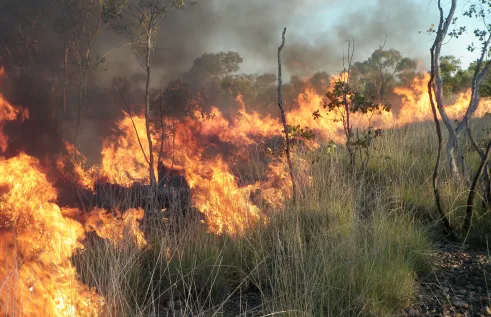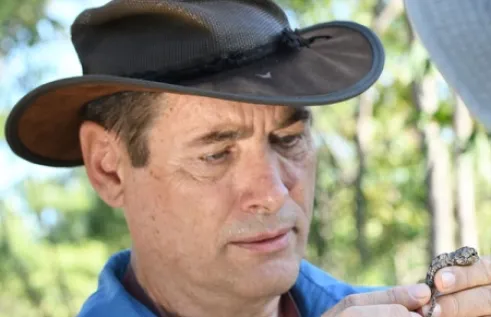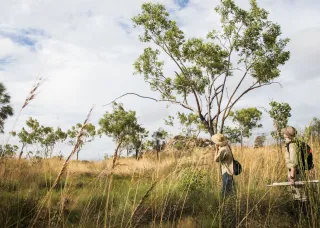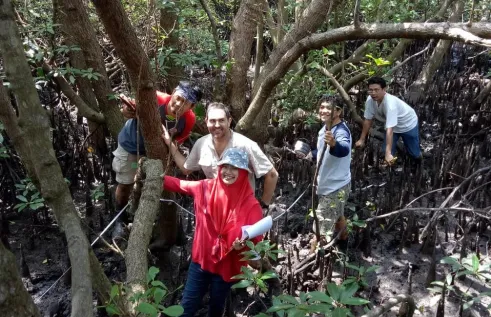Why work with RIEL?
-
Partner with internationally-recognised research leaders
-
Choose cutting edge methods and technology best suited to local contexts
-
Invest in the future by building local capacity in research
RIEL researchers provide environment and livelihoods consultancy services, including training and expert advice and review. In addition to delivering outcomes for you, working with RIEL will contribute to improved understanding of the north’s ecosystems and help build local capacity in research.
Existing service centres
Darwin Centre for Bushfire Research (DCBR)
DCBR delivers applied fire management research and training opportunities to land managers in northern Australia, Asia and more recently southern Africa.
We focus on the development of scientifically based, savanna burning carbon emissions reduction from carbon abatement and sequestration projects, through field sampling, analysis and methodology development.
Read more about the Darwin Centre for Bushfires Research.
Darwin Centre for Bushfires Research information sheet (PDF, 2.01 MB).
Bioscience North Australia
BNA is a high impact research consultancy aimed at protecting the natural assets of the Northern Territory that underpin its economy.
We specialise in metal, stable isotope, microbiological and molecular analyses in aquatic and terrestrial environments, including analyses of sediment, water and biota.
Read more about Bioscience North Australia
Aboriginal Research Practitioners Network
The Aboriginal Research Practitioners Network (ARPNet) is a platform for community based Aboriginal people who have been trained to do participatory action research, evaluations and planning.
ARPNet research practitioners offer their services to work in partnerships with other research groups or individuals on projects across Arnhem land.
It is also a platform where Aboriginal research practitioners are developing a new research practice and tool box (the ARPNet Dilly Bag) to undertake research in culturally appropriate ways without losing scientific rigour and depth.
The network provides cultural training to researchers on country and can also provide training in participatory action research.
ARPNet can facilitate community engagement in research and development, while offering local short term employment opportunities to Aboriginal people
Other services
Aquatic and terrestrial ecology
- Threatened and native species conservation - habitat and vegetation modelling, animal movement, behaviour and population analysis
- Climate change - understanding adaptations, refugia, carbon budgets and impacts on ecosystems and communities
Industry and environment
- Legislation, licence conditions and policy analysis
- Environmental impact assessments and strategic baselining
- Rehabilitation and restoration of mine sites and other disturbed areas
- Offsets and payments for ecosystem services
Participatory management and enterprise development
- Natural resource-based production in Indigenous communities, socio-economic profiling and impact assessment
- Land and sea management
- Capacity building
- Participatory action research
Technologies and methods
- 3D tech
- Drones
- eDNA
- Genetics
- Isotopes
- Lidar
- Sonar
- PCR
- Remote sensing
Water quality and quantity
- Trace metal and microbials analysis
- pollutant source tracking and pathogens
- Environmental water
- Atmospheric water
- Plant water use
- Surface and groundwater interactions
Delivering RIEL world results
-

Darwin centre for bushfire research
The Darwin Centre for Bushfire Research delivers applied fire management research and training opportunities to land managers in northern Australia, South East Asia, Africa and South America.
Read more -

Informing benchmarks for minesite rehabilitation
RIEL’s Professor Alan Andersen is working with mining giant ERA and the Northern Territory and Australian governments on a template to set specific fauna targets for rehabilitating the Ranger mine. This work will help better assess the success of minesite restoration efforts across Australia’s north.
Read more

